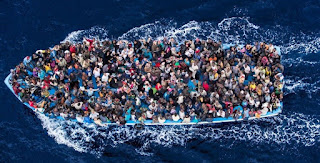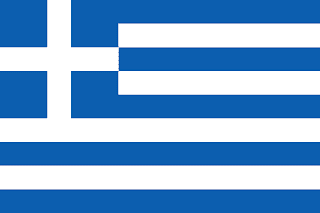The Refugee Crisis
In my college application process, I was challenged at one point to discuss a global issue and propose a solution to it. I was very intrigued by this prompt, and I realized that while I often criticize solutions brought forth by others (i.e. governments), I very rarely have the opportunity to propose my own. The plan I came to is as follows.
I believe the refugee crisis is one of the most important and impactful global issues today. The refugees themselves have been displaced from their home countries and face horrible conditions in order to migrate to other countries. Between January and July of 2018, 1,095 refugees died in transit on the Mediterranean, one in every 18 people attempting the crossing. While the main influx of refugees is concentrated in the EU, the crisis has effects in the EU and abroad, both socially and economically. Because the EU is the second largest economy in the world with a GDP of about $18.8 trillion in 2018, its well-being has an enormous impact on world trade. Therefore, when one country’s economy is weakened or the EU risks losing a member state, there will be global repercussions. With an ongoing debt crisis in Greece, additional pressure from migrants has exacerbated economic instability and led to tension among the states of the EU. Stress on European governments is leading to a far-right resurgence, and the issue is dominating politics. Italy, for example, has seen a recent power shift to the right, with the anti-immigration, anti-EU, and far-right party Lega winning 17.6% of the vote in the 2018 election. Regression to isolationism is a dangerous prospect that could weaken the EU, and an anti-immigration government normalizes intolerance in society. As far-right groups gain power in one country, that sentiment spreads throughout the world. There has been a far-right resurgence in the U.S. as well, as evidenced by the Charlottesville rallies, and with it comes the deterioration of the progress we have made against racism and hate. Undoubtedly, the crisis is detrimental to all parties involved.
In order to come to a lasting and effective solution, humanitarian and economic interests need to be balanced. Instead of attempting to resolve the entire issue through a quick fix rooted in intolerance, such as turning away migrants at the border, a long-term solution with a short-term component must be implemented. The short-term aspect of a lasting solution is to act with kindness and generosity. Societies cannot compromise their values at the onset of a crisis. The key to success of long-term solutions is initiative taken by developed countries to solve the problem at its root. As for the solutions themselves, I believe they should align with the 17 United Nations Sustainable Development Goals.
The first objective in order to halt the flow of immigrants is Goal 16: Peace, Justice, and Strong Institutions. The largest percent of refugees in recent years have been Syrian as the result of their ongoing civil war. As soon as peace is achieved, the number of refugees will decrease dramatically. The U.S. and similarly powerful countries have the opportunity to influence other governments, but this must be used to prioritize supporting a peaceful and fair leader instead of a leader partial to the US. One thing we must avoid is unnecessary violence and destabilization, as the long-term effects of conflicts such as the wars in Iraq and Afghanistan far outweigh any potential benefits. The next stage should be ensuring basic life necessities for people in developing countries, aligning with Goal 1: No Poverty and Goal 2: Zero Hunger. By improving living conditions in developing countries, the risk of future conflict is reduced and the need to migrate in order to find basic life necessities is eliminated. Nigeria, for example, both contains the largest population of people in poverty in the world, 86 million, and accounts for the fourth largest percentage of asylum applicants in EU in 2017. Finally, Goal 4: Quality Education is an underemphasized and highly impactful tool to enact change. When people are educated, they have more agency over their own governments and lives. Education is the first step in rectifying the disparity in wealth and opportunity between countries, which will eliminate the need for mass migration altogether.
I believe the refugee crisis is one of the most important and impactful global issues today. The refugees themselves have been displaced from their home countries and face horrible conditions in order to migrate to other countries. Between January and July of 2018, 1,095 refugees died in transit on the Mediterranean, one in every 18 people attempting the crossing. While the main influx of refugees is concentrated in the EU, the crisis has effects in the EU and abroad, both socially and economically. Because the EU is the second largest economy in the world with a GDP of about $18.8 trillion in 2018, its well-being has an enormous impact on world trade. Therefore, when one country’s economy is weakened or the EU risks losing a member state, there will be global repercussions. With an ongoing debt crisis in Greece, additional pressure from migrants has exacerbated economic instability and led to tension among the states of the EU. Stress on European governments is leading to a far-right resurgence, and the issue is dominating politics. Italy, for example, has seen a recent power shift to the right, with the anti-immigration, anti-EU, and far-right party Lega winning 17.6% of the vote in the 2018 election. Regression to isolationism is a dangerous prospect that could weaken the EU, and an anti-immigration government normalizes intolerance in society. As far-right groups gain power in one country, that sentiment spreads throughout the world. There has been a far-right resurgence in the U.S. as well, as evidenced by the Charlottesville rallies, and with it comes the deterioration of the progress we have made against racism and hate. Undoubtedly, the crisis is detrimental to all parties involved.
In order to come to a lasting and effective solution, humanitarian and economic interests need to be balanced. Instead of attempting to resolve the entire issue through a quick fix rooted in intolerance, such as turning away migrants at the border, a long-term solution with a short-term component must be implemented. The short-term aspect of a lasting solution is to act with kindness and generosity. Societies cannot compromise their values at the onset of a crisis. The key to success of long-term solutions is initiative taken by developed countries to solve the problem at its root. As for the solutions themselves, I believe they should align with the 17 United Nations Sustainable Development Goals.
The first objective in order to halt the flow of immigrants is Goal 16: Peace, Justice, and Strong Institutions. The largest percent of refugees in recent years have been Syrian as the result of their ongoing civil war. As soon as peace is achieved, the number of refugees will decrease dramatically. The U.S. and similarly powerful countries have the opportunity to influence other governments, but this must be used to prioritize supporting a peaceful and fair leader instead of a leader partial to the US. One thing we must avoid is unnecessary violence and destabilization, as the long-term effects of conflicts such as the wars in Iraq and Afghanistan far outweigh any potential benefits. The next stage should be ensuring basic life necessities for people in developing countries, aligning with Goal 1: No Poverty and Goal 2: Zero Hunger. By improving living conditions in developing countries, the risk of future conflict is reduced and the need to migrate in order to find basic life necessities is eliminated. Nigeria, for example, both contains the largest population of people in poverty in the world, 86 million, and accounts for the fourth largest percentage of asylum applicants in EU in 2017. Finally, Goal 4: Quality Education is an underemphasized and highly impactful tool to enact change. When people are educated, they have more agency over their own governments and lives. Education is the first step in rectifying the disparity in wealth and opportunity between countries, which will eliminate the need for mass migration altogether.
 |
| A boat of refugees in the Mediterranean |

Comments
Post a Comment